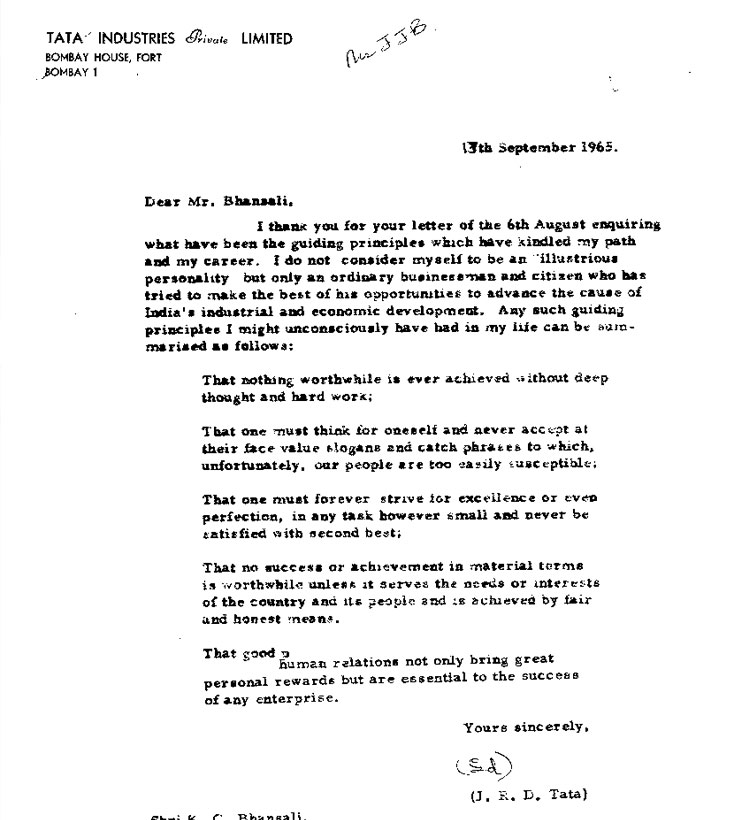Much has been written about the legacy of industrialist Jehangir Ratanji Dadabhoy (JRD) Tata, whose shrewd business sense ensured that the Tata Group became what it is today — one of the largest and longest-running conglomerates in India, which successfully diversified into chemical, automobile, tea and software industries during his chairmanship of 52 years.
While the impact he left on the socio-economic scenario of the nation remains clear even 28 years after his death, a closer look at the lesser-known chapters of his life give us a glimpse into the roots of his dedicated work ethic.
‘My guiding principles’
A letter penned by Tata in 1965 offers a perspective that goes beyond his business acumen and shines a spotlight on his sensibility, kindness, and humility instead. Highlighted by Harish Bhat, brand custodian of Tata Sons, the letter is a response to the one sent by K C Bhansali, a school teacher from Kolkata. In it, the educator had asked the businessman to share the guiding principles that “kindled” his personal and professional journeys.
Denying the school teacher’s label for him of being an “illustrious personality”, JRD, who was 62 years old at the time, said that he considers himself “only an ordinary businessman and citizen who has tried to make the best of his opportunities to advance the cause of India’s industrial and economic development”.
Summarising the ideals that unconsciously governed his way of life, the industrialist said that he believes nothing meaningful is achieved without reflection and hard work.
“That one must always think for oneself and never accept at face value slogans and catchphrases to which, unfortunately, our people are too easily susceptible,” the letter states.
“That one must forever strive for excellence, or even perfection, in any task however small, and never be satisfied with the second best,” the letter reads. “That no success or achievement in material terms is worthwhile, unless it serves the needs or interests of the country and its people, and is achieved by fair and honest means.”
Tata concludes his response by highlighting the importance of “good human relations”, which bring about “personal rewards” and also play a prominent role in a given organisation’s growth.

This thoughtful letter by the business tycoon is only one among many that he regularly wrote to people from all walks of life — loved ones, revered colleagues, bureaucratic officials and even commoners he didn’t know personally. Some three hundred of them have been compiled into a book by Rupa Publications and provide a closer look at his lifestyle, temperament, passions and values, and relationships.
Among the most-well known of the letters he received, perhaps, is the one handwritten by Indira Gandhi, India’s third and only female prime minister. Addressing him as “Dear Jeh”, Gandhi wrote the letter in February, 1978, when the Morarji Desai government removed JRD Tata as the chairman of Air India.
“I am so sorry that you are no longer with Air India… You were not merely chairman but the founder and nurturer who felt deep personal concern,” the letter reads. “There was some misunderstanding between us but it was not possible for me to let you know of the pressures under which I had to function and the rivalries within the ministry of civil aviation.”
Notably, author and social worker Sudha Murthy had also sent a postcard to JRD Tata in April, 1974, addressing the culture of sexism at TATA Engineering and Locomotive Company (TELCO), India’s largest auto manufacturer. Subsequently, the industrialist did away with the company’s “only male employees” policy, and Murthy went on to become the first woman engineer to work for TELCO.
You can read the full letter here.
No comments:
Post a Comment